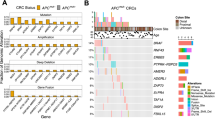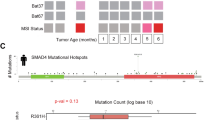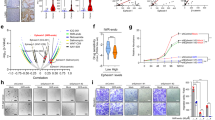Abstract
Mutated in colorectal cancer (MCC) was originally identified as a candidate gene for familial adenomatous polyposis (FAP) but further study identified adenomatous polyposis coli (APC) as responsible for FAP and the physiologic/pathologic roles of MCC remained poorly understood. Recently, MCC promoter methylation was discovered as a frequent early event in a distinct subset of precursor lesions and colorectal cancer (CRC) associated with the serrated CRC pathway. Here we provide the first evidence of the biological significance of MCC loss in CRC and the molecular pathways involved. We show MCC expression is dramatically decreased in many CRC cell lines and the distinct subset of sporadic CRC characterized by the CpG island methylator phenotype and BRAFV600E mutation due to promoter methylation as reported previously. Importantly, we find MCC interacts with β-catenin and that reexpression of MCC in CRC cells specifically inhibits Wnt signaling, β-catenin/T-cell factor/lymphoid-enhancer factor-dependent transcription and cellular proliferation even in the presence of oncogenic mutant APC. We also show that MCC is localized in the nucleus and identify two functional nuclear localization signals. Taken together, MCC is a nuclear, β-catenin-interacting protein that can act as a potential tumor suppressor in the serrated CRC pathway by inhibiting Wnt/β-catenin signal transduction.
This is a preview of subscription content, access via your institution
Access options
Subscribe to this journal
Receive 50 print issues and online access
$259.00 per year
only $5.18 per issue
Buy this article
- Purchase on SpringerLink
- Instant access to full article PDF
Prices may be subject to local taxes which are calculated during checkout






Similar content being viewed by others
Accession codes
References
Agarwal A, Das K, Lerner N, Sathe S, Cicek M, Casey G et al. (2005). The AKT/I kappa B kinase pathway promotes angiogenic/metastatic gene expression in colorectal cancer by activating nuclear factor-kappa B and beta-catenin. Oncogene 24: 1021–1031.
Ashton-Rickardt PG, Wyllie AH, Bird CC, Dunlop MG, Steel CM, Morris RG et al. (1991). MCC, a candidate familial polyposis gene in 5q.21, shows frequent allele loss in colorectal and lung cancer. Oncogene 6: 1881–1886.
Bouwmeester T, Bauch A, Ruffner H, Angrand PO, Bergamini G, Croughton K et al. (2004). A physical and functional map of the human TNF-alpha/NF-kappa B signal transduction pathway. Nat Cell Biol 6: 97–105.
Conacci-Sorrell M, Simcha I, Ben-Yedidia T, Blechman J, Savagner P, Ben-Ze'ev A . (2003). Autoregulation of E-cadherin expression by cadherin-cadherin interactions: the roles of beta-catenin signaling, Slug, and MAPK. J Cell Biol 163: 847–857.
Eleftheriou A, Yoshida M, Henderson BR . (2001). Nuclear export of human beta-catenin can occur independent of CRM1 and the adenomatous polyposis coli tumor suppressor. J Biol Chem 276: 25883–25888.
Fukuyama R, Ng KP, Cicek M, Kelleher C, Niculaita R, Casey G et al. (2006). Role of IKK and oscillatory NFkappaB kinetics in MMP-9 gene expression and chemoresistance to 5-fluorouracil in RKO colorectal cancer cells. Mol Carcinog 46: 402–413.
Gregorieff A, Clevers H . (2005). Wnt signaling in the intestinal epithelium: from endoderm to cancer. Genes Dev 19: 877–890.
Greten FR, Eckmann L, Greten TF, Park JM, Li ZW, Egan LJ et al. (2004). IKKbeta links inflammation and tumorigenesis in a mouse model of colitis-associated cancer. Cell 118: 285–296.
Groden J, Thliveris A, Samowitz W, Carlson M, Gelbert L, Albertsen H et al. (1991). Identification and characterization of the familial adenomatous polyposis coli gene. Cell 66: 589–600.
Henderson BR . (2000). Nuclear-cytoplasmic shuttling of APC regulates beta-catenin subcellular localization and turnover. Nat Cell Biol 2: 653–660.
Herman JG, Graff JR, Myohanen S, Nelkin BD, Baylin SB . (1996). Methylation-specific PCR: a novel PCR assay for methylation status of CpG islands. Proc Natl Acad Sci USA 93: 9821–9826.
Heyer J, Yang K, Lipkin M, Edelmann W, Kucherlapati R . (1999). Mouse models for colorectal cancer. Oncogene 18: 5325–5333.
Ishikawa S, Kobayashi I, Hamada J, Tada M, Hirai A, Furuuchi K et al. (2001). Interaction of MCC2, a novel homologue of MCC tumor suppressor, with PDZ-domain protein AIE-75. Gene 267: 101–110.
Ishitani T, Ninomiya-Tsuji J, Matsumoto K . (2003). Regulation of lymphoid enhancer factor 1/T-cell factor by mitogen-activated protein kinase-related Nemo-like kinase-dependent phosphorylation in Wnt/beta-catenin signaling. Mol Cell Biol 23: 1379–1389.
Ishitani T, Ninomiya-Tsuji J, Nagai S, Nishita M, Meneghini M, Barker N et al. (1999). The TAK1-NLK-MAPK-related pathway antagonizes signalling between beta-catenin and transcription factor TCF. Nature 399: 798–802.
Jass JR . (2005). Serrated adenoma of the colorectum and the DNA-methylator phenotype. Nat Clin Pract Oncol 2: 398–405.
Jass JR . (2007). Classification of colorectal cancer based on correlation of clinical, morphological and molecular features. Histopathology 50: 113–130.
Jass JR, Barker M, Fraser L, Walsh MD, Whitehall VL, Gabrielli B et al. (2003). APC mutation and tumour budding in colorectal cancer. J Clin Pathol 56: 69–73.
Jass JR, Whitehall VL, Young J, Leggett BA . (2002). Emerging concepts in colorectal neoplasia. Gastroenterology 123: 862–876.
Kinzler KW, Nilbert MC, Su LK, Vogelstein B, Bryan TM, Levy DB et al. (1991a). Identification of FAP locus genes from chromosome 5q21. Science 253: 661–665.
Kinzler KW, Nilbert MC, Vogelstein B, Bryan TM, Levy DB, Smith KJ et al. (1991b). Identification of a gene located at chromosome 5q21 that is mutated in colorectal cancers. Science 251: 1366–1370.
Kohonen-Corish MR, Sigglekow ND, Susanto J, Chapuis PH, Bokey EL, Dent OF et al. (2007). Promoter methylation of the mutated in colorectal cancer gene is a frequent early event in colorectal cancer. Oncogene 26: 4435–4441.
Lindor NM, Smalley R, Barker M, Bigler J, Krumroy LM, Lum-Jones A et al. (2006). Ascending the learning curve—MSI testing experience of a six-laboratory consortium. Cancer Biomarkers 2: 5–9.
Luo JL, Maeda S, Hsu LC, Yagita H, Karin M . (2004). Inhibition of NF-kappaB in cancer cells converts inflammation- induced tumor growth mediated by TNFalpha to TRAIL-mediated tumor regression. Cancer Cell 6: 297–305.
Matsumine A, Senda T, Baeg GH, Roy BC, Nakamura Y, Noda M et al. (1996). MCC, a cytoplasmic protein that blocks cell cycle progression from the G0/G1 to S phase. J Biol Chem 271: 10341–10346.
Nishisho I, Nakamura Y, Miyoshi Y, Miki Y, Ando H, Horii A et al. (1991). Mutations of chromosome 5q21 genes in FAP and colorectal cancer patients. Science 253: 665–669.
Nourry C, Grant SG, Borg JP . (2003). PDZ domain proteins: plug and play! Sci STKE. http://stke.sciencemag.org/cgi/content/full/sigtrans;2003/179/re7.
Ogino S, Kawasaki T, Kirkner GJ, Loda M, Fuchs CS . (2006). CpG island methylator phenotype-low (CIMP-low) in colorectal cancer: possible associations with male sex and KRAS mutations. J Mol Diagn 8: 582–588.
Prall F, Ostwald C . (2007). High-degree tumor budding and podia-formation in sporadic colorectal carcinomas with K-ras gene mutations. Hum Pathol 38: 1696–1702.
Rosin-Arbesfeld R, Townsley F, Bienz M . (2000). The APC tumour suppressor has a nuclear export function. Nature 406: 1009–1012.
Senda T, Matsumine A, Yanai H, Akiyama T . (1999). Localization of MCC (mutated in colorectal cancer) in various tissues of mice and its involvement in cell differentiation. J Histochem Cytochem 47: 1149–1158.
Shinto E, Tsuda H, Ueno H, Hashiguchi Y, Hase K, Tamai S et al. (2005). Prognostic implication of laminin-5 gamma 2 chain expression in the invasive front of colorectal cancers, disclosed by area-specific four-point tissue microarrays. Lab Invest 85: 257–266.
Sizemore N, Lerner N, Dombrowski N, Sakurai H, Stark GR . (2002). Distinct roles of the Ikappa B kinase alpha and beta subunits in liberating nuclear factor kappa B (NF-kappa B) from Ikappa B and in phosphorylating the p65 subunit of NF-kappa B. J Biol Chem 277: 3863–3869.
Weisenberger DJ, Siegmund KD, Campan M, Young J, Long TI, Faasse MA et al. (2006). CpG island methylator phenotype underlies sporadic microsatellite instability and is tightly associated with BRAF mutation in colorectal cancer. Nat Genet 38: 787–793.
Zhang F, White RL, Neufeld KL . (2000). Phosphorylation near nuclear localization signal regulates nuclear import of adenomatous polyposis coli protein. Proc Natl Acad Sci USA 97: 12577–12582.
Zlobec I, Lugli A, Baker K, Roth S, Minoo P, Hayashi S et al. (2007). Role of APAF-1, E-cadherin and peritumoral lymphocytic infiltration in tumour budding in colorectal cancer. J Pathol 212: 260–268.
Acknowledgements
We thank Dr Kenneth W Kinzler, Dr Kazuo Maruyama, Dr Inder Verma, Dr Bert Vogelstein and Dr Bryan Williams for the various reagents used for this work as well as Lisa Krumroy and Alona Merkulova for technical assistance. This work was supported by grants to NS from the Cleveland Clinic Taussig Cancer Center/Scott Hamilton CARES Initiative and the National Cancer Institute Grant CA 100748.
Author information
Authors and Affiliations
Corresponding author
Additional information
Supplementary Information accompanies the paper on the Oncogene website (http://www.nature.com/onc)
Rights and permissions
About this article
Cite this article
Fukuyama, R., Niculaita, R., Ng, K. et al. Mutated in colorectal cancer, a putative tumor suppressor for serrated colorectal cancer, selectively represses β-catenin-dependent transcription. Oncogene 27, 6044–6055 (2008). https://doi.org/10.1038/onc.2008.204
Received:
Revised:
Accepted:
Published:
Issue Date:
DOI: https://doi.org/10.1038/onc.2008.204
Keywords
This article is cited by
-
Characterization and clinical evaluation of microsatellite instability and loss of heterozygosity within tumor-related genes in colorectal cancer
BMC Medical Genomics (2021)
-
PRMT5/Wnt4 axis promotes lymph-node metastasis and proliferation of laryngeal carcinoma
Cell Death & Disease (2020)
-
STRA6 exerts oncogenic role in gastric tumorigenesis by acting as a crucial target of miR-873
Journal of Experimental & Clinical Cancer Research (2019)
-
Global differences in the prevalence of the CpG island methylator phenotype of colorectal cancer
BMC Cancer (2019)
-
‘MCC’ protein interacts with E-cadherin and β-catenin strengthening cell–cell adhesion of HCT116 colon cancer cells
Oncogene (2018)



